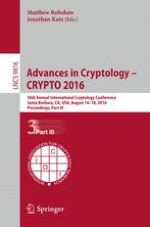2016 | OriginalPaper | Buchkapitel
Adaptive Versus Non-Adaptive Strategies in the Quantum Setting with Applications
verfasst von : Frédéric Dupuis, Serge Fehr, Philippe Lamontagne, Louis Salvail
Erschienen in: Advances in Cryptology – CRYPTO 2016
Verlag: Springer Berlin Heidelberg
Aktivieren Sie unsere intelligente Suche, um passende Fachinhalte oder Patente zu finden.
Wählen Sie Textabschnitte aus um mit Künstlicher Intelligenz passenden Patente zu finden. powered by
Markieren Sie Textabschnitte, um KI-gestützt weitere passende Inhalte zu finden. powered by
